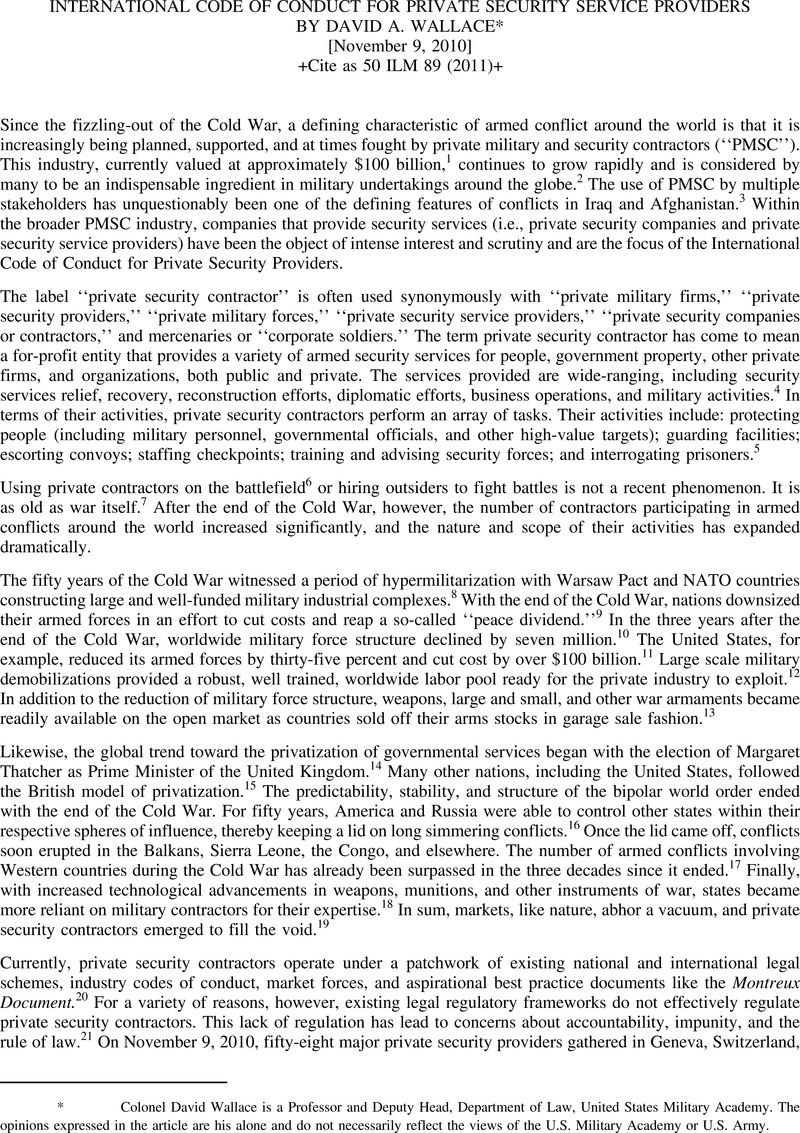Article contents
International Code of Conduct for Private Security Service Providers
Published online by Cambridge University Press: 27 February 2017
Abstract

- Type
- International Legal Documents
- Information
- Copyright
- Copyright © American Society of International Law 2011
References
End notes
* This text was reproduced and reformatted from the text available at the News Portal of the Federal Administration of the Swiss Confederation website (visited Jan. 31, 2011) http://www.news.admin.ch/NSBSubscriber/message/attachments/21143.pdf.
1 Nils, Rosemann, Code of Conduct: Tool for Self Regulation for Private Military and Security Companies 9 (Geneva Ctr. for Democratic Control of the Armed Forces, Occasional Paper No. 15), available at http://www.dcaf.ch/Publications/Publication-Detail?lng=en&id=94661 Google Scholar.
2 Id. at 5.
3 Hearing on “Are Private Security Contractors Performing Inherently Governmental Functions,” Comm’n on Wartime Contracting in Ir. & Afg., 1 (2010) (written testimony of Human Rights First), http://www.humanrightsfirst.org/wpcontent/uploads/pdf/HRF_Testimony_CWC-06-18-10.pdf. The Commission on Wartime Contracting is an independent, bipartisan commission established by Congress to study wartime contracting practice in Afghanistan and Iraq. Congress authorized the commission in Section 841 of the National Defense Authorization Act of 2008, and the so-called “Truman Committee” served as a model for it. Led by Senator Harry Truman, the Truman Committee investigated fraud and waste in the U.S. government during and after World War II. COMMISSION ON WARTIME CONTRACTING, http://www.wartimecontracting.gov (last visited Jan. 26, 2011).
4 International Code of Conduct for Private Security Providers pmbl. ¶ 1, Nov. 9, 2010 [hereinafter ICoC].
5 Emanuela-Chiara, Gillard, Business Goes to War: Private Military/ Security Companies and International Humanitarian Law, 88 INT’L REV. OF THE RED CROSS 525, 526 (2006)Google Scholar Pete, W. Singer,Can’t Win with ‘Em, Can’t Go to War Without ‘Em: Private Military Contractors and Counterinsurgency 3 (Foreign Policy Paper No. 4), (Sept. 2007)Google Scholar.
6 The Third Geneva Convention Article 4(A)(4) specifically accounts for contractors on the battlefield. It identifies supply contractors as “[p]ersons who accompany the armed forces without being members thereof . . . .” Geneva Convention Relative to the Treatment of Prisoners of War art. 4(A)(4), Aug. 12, 1949, 6 U.S.T. 3316, 75 U.N.T.S. 135. The Third Geneva Convention entitles such contractors to prisoner of war status upon capture.
7 Pete, W. Singer, Corporate Warriors: the Rise of the Privatized Military Industry 19 (2008)Google Scholar.
8 Ken, Silverstein, PRivate WARRIORS viii (2000); Singer, supra note 7, at 53Google Scholar.
9 Silverstein, supra note 8, at viii.
10 Benedict, Sheehy, Jackson, Maogoto & Virginia, Newell, Legal Control of the Private Military Corporation 13 (2009)Google Scholar.
11 Scott, M. Sullivan, Public Force/Private Goods, 42 CONN. L. REV. 853, 881 (2010)Google Scholar.
12 Singer, supra note 7, at 49-50.
13 Id. at 53-55.
14 Devan R., Desal, Have Your Cake and Eat it Too: A Proposal For a Layered Approach to Regulating Private Military Companies, U.S.F. L. REV . 833 (2005). In the United States, the push for outsourcing of public functions to the private sector can be traced back to 1996 when the Office of Management and Budget released a revised Circular A-76Google Scholar.
15 Singer, supra note 7, at 67.
16 David, Isenberg, A Government in Search of Cover, Private Security Companies in Iraq, in FROM MERCENARIES TO MARKET 82 (Simon, Chesterman & Chia, Lehnardt, eds., 2007)Google Scholar.
17 Sullivan, supra note 11, at 881.
18 Isenberg, supra note 16, at 82.
19 Id.
20 James, Cockayne, a leading authority on the regulation of PMSC, accurately notes that the Montreux Document should not be read in a vacuum. Rather, it should be read along with only applicable legal regimes, such as the Geneva Conventions (1949) and the Additional Protocols (1977); the Universal Declaration of Human Rights (1948); the UN Code of Conduct for Law Enforcement Officials (1979); and the UN Basic Principles on the Use of Force and the ILO Conventions and Recommendations. JAMES COCKAYNE & EMILY SPEERS MEARS, PRIVATE MILITARY AND SECURITY COMPANIES: A FRAMEWORK FOR REGULATION 1 n.1 (2009), available at http://www.operationspaix.net/IMG/pdf/IPI_PrivateMilitarySecurityCompanies_FrameworkForRegulation.pdf Google Scholar.
21 Hans, Born & Anne-Marie, Buzatu, Recommendations to the Council of Europe Parliamentary Assembly for Effective Regulation of Private Military and Security Companies 3 (2008), available at http://www.privatesecurityregulation.net/files/CoE%20DCAF%20PMSC%20Report.pdf Google Scholar.
22 ICoC, supra note 4, art. 7.
23 Id. pmbl. ¶ 2.
24 The term “corporate warriors” is in the title of perhaps the definitive book on private military and security contractors. P. W. SINGER, CORPORATE WARRIORS – THE RISE OF THE PRIVATIZED MILITARY INDUSTRY (2003).
25 From MERCENARIES TO MARKET 2 (Simon Chesterman & Chia Lehnardt, eds., 2007).
- 1
- Cited by




